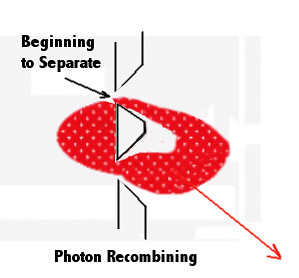The photon lives in a “go-splat” world. The clock of a photon completely stops the instant it is emitted and stays stopped throughout its journey. The distance traveled by a photon becomes zero as compared to the distance measured by the stationary observer. It may take a photon a billion years to cross from a distant galaxy to our telescope from our perspective, but for the photon, as soon as it is emitted, it arrives – splat; there is no time elapse in the photon world. In effect, the space and time between the photon’s emission and its destination are severely warped.
Therefore, the photon’s world is flat and stapled together, front-to-back, between its start point and its end point. In effect, the photon is touching its emitter on one end and our eye on the other with zero depth of field. Whatever phase it has at the time of emission, it has when it hits our telescope because it is all frozen in time. Physicists call the time experienced by the photon null time and the path the null time path.
It is this stapled together, zero time world that I believe explains much of the quantum weirdness we experience. Our life and experimental experiences are so strong that we can’t easily get our minds around the relativistic phenomena.



